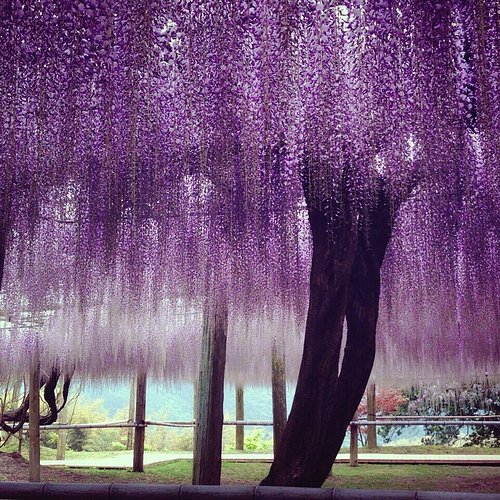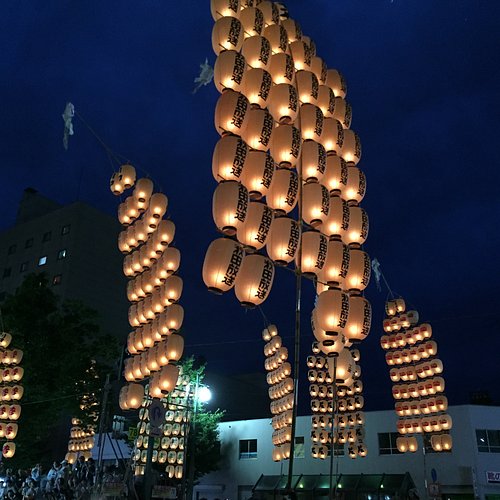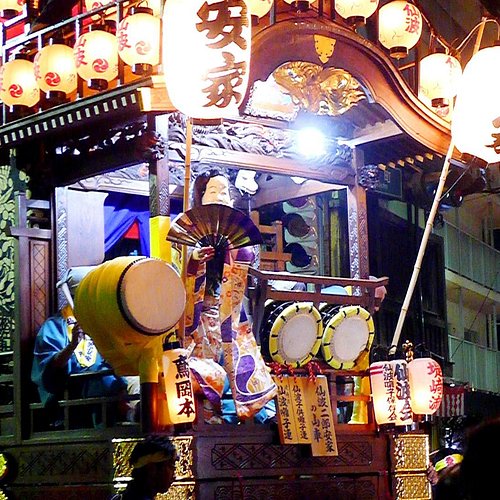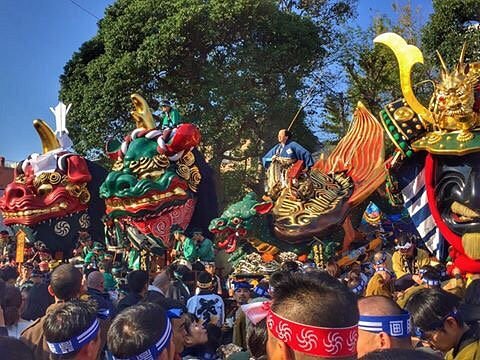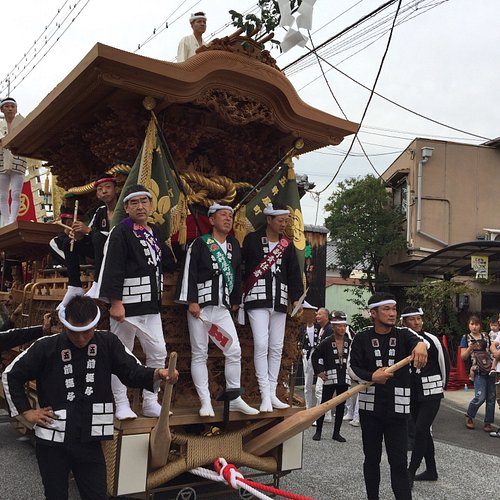The 10 Best Events in Japan, Japan
Coordinates: 35°N 136°E / 35°N 136°E / 35; 136
Restaurants in Japan
1. Nagaoka Festival Grand Fireworks
Overall Ratings
5.0 based on 111 reviews
One of the three great fireworks festivals of Japan, this is the main event that heralds the finale of the Nagaoka Festival. It was selected in 2016 as No.1 fireworks events, as chosen by noted fireworks experts. A must-see is a super-massive ball of fireworks, the "star mine," which is a congeries of five different-colored fireworks launched from five angles, and select Ju-go tama balls crafted by each fireworks veteran, with crowd-pleasing designs. A total of 20,000 fireworks are launched, and attendees number close to one million. The Nagaoka Festival itself was launched in 1946 as the Nagaoka Recovery Festival, a prayer for recovery after the August 1, 1945 air raids.
2. Kitakyushu City Kawachi Fuji Garden Wisterias Blossom
Overall Ratings
4.5 based on 241 reviews
In the spring, the Kawachi Fuji Gardens open their Wisteria tunnels to the public. Wisteria, lauded in Japanese poetry, bloom strongest between April and May. The Kawachi Fuji Wisteria are especially lovely, as the hundred-year old trees are arranged to blossom around domes and trellises, with clusters of flowers hang down in delicate rows, leaving only patches of streaming sunlight in between. The magical sight attracts visitors from all over the world. Over twenty species of Wisteria compose the two main tunnels, one 260 feet long, and the other 720 feet long. Each features an explosion of petals from lavender to deep royal purple, with bursts of pink, blue, and white in between.
Reviewed By kimitakas - Taichung, Taiwan
Kawachi Wisteria Garden is one of highlights for the sightseeing in Kitakyushu. The season is at the end of April and the beginning of May. To avoid the crowds, you should obligatorily book an entrance coupon at convenience store. On a less crowded day, that coupon is used as an entrance ticket. For a crowded day, you have to pay an extra fee at the entrance gate in addition to that coupon. To access the site, the most convenient is driving a car. Otherwise, you can take a public bus from JR Yahata station, and walk about half an hour. It is not bad, and even recommendable to walk, because the way to wisteria park is a very pleasant promenade.
3. Akita Kanto Festival
Overall Ratings
4.5 based on 105 reviews
The Kanto, or "Pole Lantern", Festival is held from August 3-6. Performers take to the street en masse to show their skill in balancing bamboo "kanto" poles. Each pole, which can be up to 40 feet tall and 90 pounds in weight, has paper lanterns tied to its top-- all with a real, lit candle inside! Entertainers are expert in wielding these, and when the Night Parade takes over the festival's main street, over 250 kanto poles light the area, and a 90-minute show gets underway. Energy is high as drums, flutes, and a crowd chanting "dokkoisho!" accompany the performers as they heft aloft the kanto. Afterwards, guests are welcome to give it a try themselves.
4. Aomori Nebuta Festival
Overall Ratings
4.5 based on 104 reviews
The Nebuta Summer Festival (or Matsuri) that takes place in early August every year in Aomori is quite simply one of the most unforgettable and unique street parades in the world. Local teams work each year to build 24 huge floats using wire frames covered with washi paper that sometimes represent Japanese gods and mythical creatures, but also historical figures and the contemporary actors that play them in Kabuki theatres and on Japanese TV. These intricately crafted sculptures are then lit from the inside with thousands of colourful lights and paraded each night around a 3km loop in the town of Aomori. Thousands of people take a part in carrying the floats, parading with taiko drums, flutes and cymbals, and dancing in traditional costumes chanting Rassera! Rassera! It's breathtaking to watch the vivid, colourful floats weaving at night through the throngs of musicians and dancers and you can find your own spot or reserve seating to enjoy it all. But that's not all. Anyone, regardless of age or ability, is invited to join in as long as they are wearing the traditional haneto dancing costume (which can be rented for about $30 from shops all over Aomori). Unforgettable!
5. Hachinohe Sansha Taisai
Overall Ratings
4.5 based on 33 reviews
The summer festival of Hachinohe Sansha Taisai is historic to is prefecture, having been celebrated for over two-hundred years. The festival is characterized by a parade of large, intricate floats with images from myth and history. These floats are unique, in that along with being massive constructions, they are also mechanized: with floating dolls, moving parts, and even valves that release smoke. Over 25 floats are accompanied by dancers performing traditional renditions of the lion, tiger, and bamboo leaf dances, along with flute and drum music. The festival takes place July 31st-August 4th.
6. Kawagoe Matsuri
Overall Ratings
4.5 based on 34 reviews
Celebrated for over 360 years, the Kawagoe Matsuri is a proud tradition celebrating the area's Edo culture. Held every 3rd weekend of October, brilliant, large-scale festival floats amass around the "old" part of town, where steeple-roofed temples, lively food stalls, and wide streets give off a historic charm. The floats, which crowd the area, are decorated with dolls and sets. The highlight of the festival is "Hikkawase", when these floats compete at "ohayashi", a type of dance accompanied by frenzied flues, handbells, and drums. The crowd joins in by hoisting up lanterns and chanting.
Reviewed By HariC397
For me, this activity (carrying mikoshi while chanting) is the most impressed and attractive. People chanting in unison and in a rhythmic way while carrying very heavy mikoshi (a sacred religious palanquin in Shinto shrine). The activity is often held in the first day of 2-day Kawagoe festival, in last weekend of October annually. The most convenience way to Kawagoe from Tokyo is using Tobu Tojo line from Ikebukuro to Kawagoe station. Kawagoe discount pass can saved you some bucks.
7. Sapporo Snow Festival
Overall Ratings
4.5 based on 399 reviews
The Sapporo Snow Festival happens in early February each year, transforming the town of Sapporo into a unforgettable winter wonderland of snow and ice sculptures, skating rinks, giant snow slides, zip lines, snow domes and ice bars, and night time illuminations, all presided over by of course, the Ice Queen! There's a myriad of sculptures to see and events to enjoy across three sites in Sapporo and it's not surprising that this event is internationally renowned for its scale, variety, and sheer amount of fun available for all visitors.
Reviewed By PaulS901 - Sydney, Australia
This year was the 71st Sapporo snow festival our team was representing Australia in the 47th snow sculpture competition this was the Fourth tme our Australian Team from Shoalhaven had competed. The Sapporo snow festival is one of the biggest and most popular festivals in Japan which covers 1.5 Km in Odori Park and is held over 10 days with some of the amazing snow sculpture created by the Japanese Army and the citizens of Sapporo and incorperates 12 International time including Australia competing and show casing the art of snow sculpturing. Our Australian sculpture this year was the NSW state emblem our Native Waratah, The snow festival with many pop up food stalls and laser light shows of a night has a visitation of over 1 million people. The Snow Festival is well with a visit as Sapporo is a modern vibrant city with much to offer any tourist.
8. Hirosaki Cherry Blossom Festival
Overall Ratings
4.5 based on 171 reviews
A spring festival at Hirosaki Park, famous for its cherry blossoms and boasting 2,600 cherry trees in about 50 varieties, such as Weeping Cherry and Double-Flowered Cherry. Held every year between April 23rd and May 5th, it delights the eyes of tourists with its cherry tree tunnel and western moat dyed the color of cherry blossoms. The cherry trees illuminated at night seem to float magically and make for a different charm than in the daytime. Don't miss the flowering of such invaluable trees as Japan's oldest Yoshino cherry (planted in 1882) and largest circumference Yoshino cherry (a little over 5m).
9. Karatsu Kunchi
Overall Ratings
4.5 based on 23 reviews
"Kunchi" is the popular name for the autumn festival in northern Kyushu, which is a votive festival held to give thanks for the harvest. It can be written in several different ways in Japanese, meaning "offering day," "shrine day," or "ninth day." Karatsu Kunchi is a regular autumn festival held at Karatsu Shrine every year from November 2nd to 4th, and it has been designated an important tangible cultural property by Saga Prefecture and the national government. The highlight is the festival floats in the shapes of enormous fish, lions, and dragons. Made with a technique called ikkanbari which layers lacquer over papier mache, the gorgeous floats are vividly colored in crimson, blue, black, and gold. The festival floats bobbing along by lantern light at night are beautiful and magical, and the sight of the parade through the streets in the afternoon to chants of "Enya, Enya" is very impressive.
Reviewed By mag_ty - Singapore, null
Excellent festival occurring in November - the atmosphere is superb and invigorating! Worth the time and travel from Fukuoka if you are in Japan during the festival time!
10. Danjiri Matsuri (September)
Overall Ratings
4.5 based on 35 reviews
The festival floats and drum floats used as an offering in festivals are called danjiri in western Japan, and "Danjiri Matsuri" is a collective term for festivals that use them. Particularly famous is the Kishiwada Danjiri Matsuri, in which danjiri, some weighing up to 4 tons, are decorated with carvings, paper lanterns, and banners and vigorously hauled through the streets. It is known as a boisterous festival, but the intensity and flamboyance captivate tourists. In the old days, it was held during the eighth month of the traditional Japanese calendar, but since 2006, it has been held on the Saturday and Sunday before Respect for the Aged Day (the third Monday in September).


